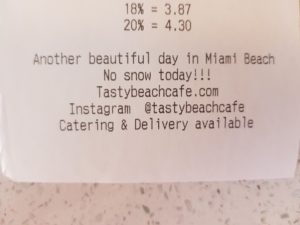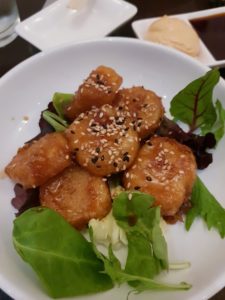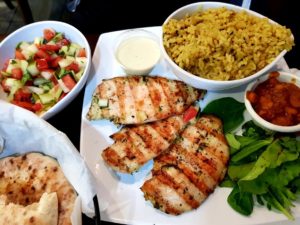
I spent my vacation with a good friend of the Jewish faith. During this time I learned a lot about religion and also about the Jewish food law.
I’m sure you’ve heard the word kosher before. In colloquial language, the term is used as an expression for “okay”. When you say something is not kosher, you mean that something is wrong. But what does kosher really mean?
Kosher food and cooking, what does that mean exactly?
Kosher is the name given to all foods that comply with the Jewish food laws regulated in Kashrut. Believing Jews orientate themselves according to these laws and therefore consume only kosher food. Non kosher foods are called “trefe” and are forbidden.
What are kosher foods and how do you recognize them?
Kosher foods are marked with a kosher seal. The so-called “Hechscher” is assigned by a specially trained supervisor, the Maschgiach. He has insight into the production of the products and ensures that the food laws are observed during processing. In the USA and Israel, the Hechscher is printed directly on the packaging of the product. In other countries there are guides listing kosher foods.
There are two levels of certification:
- Glatt kosher (particularly strictly tested meat)
- kascher le-mehadrin (super kosher)
With meat, the whole thing is a little more complicated. Only meat from ruminant cloven hoofed animals may be eaten. This includes cows, sheep and goats. Pork is also forbidden in the Jewish faith. Also the meat of horses, camels and wild animals. Chickens, ducks and geese are kosher, while birds of prey and songbirds are more common. Fish may only be eaten if they have fins and scales. Seafood, mussels, shrimp, lobster and fish such as eel are not on the menu. Leviticus 11 lists in quite detail which animals are kosher.
Kosher is the meat only if the animal is slaughtered in a ritual way. Jews as well as Muslims are strictly forbidden to eat blood. Eggs must also be examined very carefully for drops of blood. A specially trained butcher slaughters the animal according to the strict religious law “Halacha”. The throat of the animal is cut according to regulations and it is allowed to bleed out. The remains of the blood are removed and “koshered”. In this process, the meat is repeatedly soaked in water and salted.
Meat and milk are strictly separated
“You shouldn’t cook a goat’s boy in his mother’s milk”
The biblical commandment is now interpreted in such a way that all meat dishes and dairy products are strictly separated. They must neither come into contact with each other nor be eaten together. The food Jews eat is divided into three categories:
– milky (chalvi)
– fleshy (basari)
– neutral (parve)
The foods in the Parve category may be combined with both meaty and milky products. The milky and fleshy products must not be mixed in the stomach either. For this reason, waiting times of at least three hours are observed between the two types of food. Kitchen utensils, kitchen machines, stoves, dishwashers, etc. are also separated according to food category. This is the reason why every household has at least two sets of dishes. Kitchen utensils such as tea towels, cutlery, etc. are always available in duplicate.
In concrete terms, this means, for example, that after a piece of meat, no dessert with dairy products may be eaten. But if fish is eaten with the main course, a milky course may follow.
Restaurants
A distinction is also made between milky and meaty restaurants. During our trip we had some meals in kosher restaurants. Here are my restaurant tips for Miami and Orlando:
Seventeen Restaurant & Sushi Bar, Miami Beach
 In addition to sushi, the small restaurant also offers other fish dishes, salte, wraps and pasta. The staff was very friendly and the food was totally delicious! Parking spaces are available in the side street.
In addition to sushi, the small restaurant also offers other fish dishes, salte, wraps and pasta. The staff was very friendly and the food was totally delicious! Parking spaces are available in the side street.
Eaten:
Salmon Teriyaki
Fresh fried salmon in a teriyaki sauce (soy sauce) and grilled vegetables & rice
USD 24.95
Salmon Spinach
Fresh fried salmon in a mushroom cream sauce, served with spinach and grilled vegetables & rice
USD 24.95
The Tasty Beach Cafe is a very well frequented restaurant with a hipster look. Many meet here for coffee, a tasty breakfast or a snack. The cafe offers wraps & sandwiches, fresh salads, smoothies & a selection of breakfast dishes – everything your heart desires.
Eaten:
Healthy Start Wrap
Scrambeld egg white with fresh tomatoes, basil and mozzarella, rolled in a wholemeal wrap
Price: USD 12
A very well frequented restaurant in the evening which is modern furnished. On the menu you will find various sushi creations and tapas. The service very friendly and set up and the food simply super delicious!
Eaten:
Nitro Scallops
False scallops in tempura dough, served with two sauces
Price: USD 13
Cheese Duo Empanadas
Flavoured Empanada dough filled with ripe cheese
Price: USD 12


Crunchy Tiger
Crispy Suhi roll with salmon Tempura and avocado
Price: USD 14
Churros Dulce de Lece
Churros with a sauce of condensed milk and fresh strawberries
Price: unknown
Glatt Kosher Grill, Orlando
This was the only kosher restaurant in Orlando we found on the Internet. The menu offers exactly what I have wished for: In addition to classic dishes such as salads and burgers, traditional Israeli dishes like falafel and hummus can also be found on the menu.
Eaten:
Falafel and hummus
Price: USD 11.95


Grilled Chicken
Grilled chicken breast, served with rice, salad and two different sauces
Price: USD 21.95
Personal conclusion:
What I ate tasted good. Basically, there is no difference between kosher food and “normal food”. But I couldn’t integrate kosher food into my everyday life. I would have to do without too many of my favourite dishes such as seafood, pizza topped with bresaola or a classic plate of spaghetti bolognese with grated parmesan. Another point that disturbs me personally is the horrendous prices for kosher food. I get a protein wrap from a conventional restaurant in Miami for about 7 to 9 dollars. The same product costs almost twice as much in a kosher restaurant. What I have noticed: Many of the dishes I know as salty are rather sweet in the kosher version. For example, we have eaten sweet fish, even the traditional plait bread that is served with the meal is sweet. Does anyone know why?
Do you have any additions, questions or feedback about this article? I am very grateful for a comment.

Leave a Reply